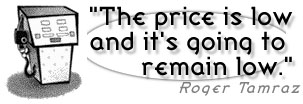|
Oil deal won't pump prices
|
 |
December 1, 1998: 11:41 a.m. ET
Merger of Exxon and Mobil may not mean paying more at the pump
|
NEW YORK (CNNfn) - The merger of two names very familiar to drivers in the United States doesn't necessarily mean those drivers will be paying more at the pump.
Oil giants Exxon Corp. and Mobil Corp. confirmed their merger plans Tuesday, creating Exxon Mobil Corp., the world's largest corporate oil company, in a deal worth $79 billion.
Ironically, the deal will reunite two companies which both evolved from Standard Oil, a corporate behemoth which was broken up in 1909 because it violated antitrust laws.
That may be enough to create concerns among drivers in the United States, who this summer saw another merger announced between British Petroleum Plc (BP) and Amoco Corp. (AN)
All of these companies run extensive chains of gas stations in the United States. Often, they are across the street from each other. The combination of Exxon and Mobil would have more than 50,000 gas stations around the world.
Whenever two major oil foes team up there is always the concern that a smaller field of companies will create less competition, pushing oil, and consequently gasoline, prices up.
But Roger Tamraz, president of Oil Capital Ltd., said this deal is unlikely to change things much.
"The price is low and it's going to remain low," said Tamraz. "At least that's the perception of the oil industry."
A glut of oil on the world market has helped drivers to take advantage of extremely low gas prices.
World oil prices are currently hovering around 12-year lows and haven't been helped by continuing oil exports from Iraq.

The Organization of Petroleum Exporting Countries (OPEC) has in the past worked to keep oil prices higher and more stable. But recently, the power of the group to rein in production seems to have diminished.
Last week, OPEC, meeting in Vienna, ended its biannual meeting and said it would deal with output matters at its next meeting, to be held in March of 1999.
The glut comes at a bad time for oil companies but at a good time for consumers. With winter approaching, heating oil demand goes up but an increased supply would dampen the effect on prices.
In addition, oil companies may be hurt by La Nina. La Nina is produced by the cooling of the sea surface in the equatorial Pacific Ocean, compared with El Nino which comes from a warming of the sea surface.
Weather forecasters vary on what La Nina's effect will be on the upcoming winter, but the consensus tends toward predicting a slightly colder winter in the United States.
However, Larry Goldstein, president of the Petroleum Industry Research Foundation, said the temperature will not be the main determinant of heating oil prices.
"Heating oil prices will be influenced by the weather but its price will mainly be lower this winter because of the overproduction of crude oil," said Goldstein.
Gas prices decelerating
Companies like Mobil and Exxon have been dealing with low gas prices for months. According to the most recent Lundberg Survey of gas stations, the average price of gas was $1.0731 per gallon, down 1.28 cents from a survey done at the beginning of November.
The price of gas has fallen by nearly 18 cents since the November of last year.
"Very low crude prices have been working their way through to the gas pump, and the economic problems elsewhere, particularly in Asia, have created a glut of oil," according to Trilby Lundberg, publisher of the survey.
Rather than looking at combinations as a way to bump up prices, companies like Mobil (MOB) and Exxon (XON) are instead looking to cut costs, explained Jeremy Elden, head of oil and gas research at Commerzbank.
"The industry is going through a great big marriage market where companies are seeking to find partners," he said.
"The industry is facing up to the fact of probably several more years of very low margins. Mergers are a further way of reducing costs and I think pretty well all the players will be reviewing their options."
There could be more mergers between firms familiar to drivers on the road ahead. Elden speculated Chevron Corp. (CHV) and Texaco Inc. (TX) are probably considering their options at this time.
-- by staff writer Randall J. Schultz
|
|
|
|
|
 |

|

